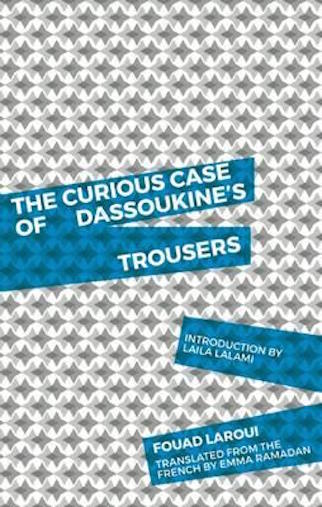Book Review: “The Curious Case of Dassoukine’s Trousers” — In-between Worlds
Fouad Laroui’s striking collection of stories describes a world “where everything is foreign.”
The Curious Case of Dassoukine’s Trousers by Fouad Laroui, translated by Emma Ramadan. Deep Vellum, 135 pp., $14.95.
By John Taylor

The Curious Case of Dassoukine’s Trousers is a kind of book that’s rarely found in English: a collection of short stories translated from the French. And what enjoyment these nine stories provide in Emma Ramadan’s versions! Fouad Laroui is witty and stylistically experimental. He shrewdly observes how politics, religion, racism (and anti-racism), economics, and sundry philosophical “theories” interact with the quotidian. Rather like C. P. Cavafy (in E. M. Forster’s depiction), he stands at “a slight angle to the universe.” Well, to be absolutely accurate, his angle is wider than the Greek poet’s. And although Laroui sometimes suffers from the impossibility of having—of being given—any other vantage point, he also clearly takes delight in this particular slant. The story “Dislocation” tellingly opens: “What would it be like, he asked himself, a world where everything was foreign?”
The author is in an excellent position to ponder the question. Born in Morocco in 1958, he studied engineering in Paris, received a PhD in Economics in the United Kingdom, and then moved to the Netherlands, where he teaches econometrics and environmental science at the University of Amsterdam. He writes his short stories in French, his poems in Dutch, and his academic papers in English. This collection won the Prix Goncourt de la Nouvelle, which is the most important French award devoted to the short story.
“Dislocation” in particular provides insights into cultural dichotomies, exploring the introspective dilemmas and social quandaries they create. Taking off from, and then embellishing, the aforementioned speculative question (about “a world where everything was foreign”), every new paragraph generates more and more illustrations of foreignness. Here’s the seventh paragraph, where Maati, the narrator, continues to muse on his own life:
What would it be like, he asked himself, walking slowly in the direction of his house, where his wife Anna was waiting for him—sweet, kind Anna, whom he had ended up marrying in order to settle down (isn’t that what it was called, in times past, in the world of Parisian courtesans?—Oh Maati, you and your French references. . . and sometimes she would add: You aren’t even French, you’re Moroccan.)—a world where everything was foreign?
The reiteration of this opening question about a world of foreignness occurs fifteen times. In the process, the narrative expands like a mini-universe, tossing out new thoughts, events, and facts. Not only does a heady, poignant self-portrait emerge, but also some droll social commentary. For example, Maati prides himself on the fact that, while learning Dutch, he has also learned German. “I’m cold and I eat tasteless things, but at least I’ve learned [. . .] the language of the philosophers, and now I know the exact meaning of aufheben.” As the stream-of-consciousness narration continues, he adds: “We were really impressed by them, the Althussers and the consorts, the Derridas, the Glucksmanns, in Paris, when they threw out words like that one, without translating them, as if they were using an abracadabra only they could access.”
Maati considers himself to be “Moroccan by birth, in body, but ‘French in the head’,” as he vainly tries to explain to Anna, “a good little Protestant” who doesn’t “establish any hierarchy between Moroccans and the French. . . nor between the Chinese and the Peruvians, nor between anyone and anybody. . .” Yet despite his worldliness and intellectual sophistication, Maati remains, as he shifts to third-person-singular narration, “an immigrant in a world where he doesn’t know the codes, or only very vaguely, where each day he must discover the codes.” Laroui brings no agenda to his examination of equalities and differences. He pokes fun at both.

Moroccan author Fouad Laroui is witty and stylistically experimental.
There was that night, for instance, when “[Maati] had enthusiastically plunged his spoon into the soup bowl, the night when [Anna’s] parents were visiting—hey, we have to wait for the short prayer giving thanks to God for the food on the table—wasn’t her father a pastor of the Reformed Church of the Netherlands? Hadn’t he accepted, this strict father (but not overly), bearded like Jehovah (but not overly), Bach amateur (without moderation). . .”
These lively stories are nurtured in these limbo states, twisting and turning among worlds (religious, social, cultural, and political) that are potentially at (great) variance. The title story begins with the declaration that “Belgium really is the birthplace of Surrealism.” It relates an incredible, indeed surrealistic, succession of events that befalls a Moroccan governmental minister, including the theft of his only pair of pants and most of his money. He is forced to buy a pair of used, faded “golf trousers, the work of a mad tailor, the trappings of a clown” so that he can still attend a European meeting in Brussels, where he has been sent on a crucial mission to negotiate the purchase of some flour for his drought-stricken country. The minister’s tale is tall, broad, and too long to detail here, especially a hilarious part about mistaken identity, but an acute political point subtly surfaces from the frenzied incidents. “Well, I got the flour for nothing,” concludes the minister. “[The other ministers] remembered, quite pertinently, that there was an emergency stock for desperate cases, like for Somalia, Chad, and other countries where the ministers dress in rags. Pounds of grain for free! Tonight they’re throwing me an extravagant reception at the Rabat airport. ‘The man who saved his country a hundred thousand euros!’ It’s really my trousers they should be honoring.”
Arguably, the narrators and main characters of these tales are closely modeled on the author. The events seem experienced, closely eye-witnessed, or carefully overheard. They are presented in a tongue-in-cheek way. We often find an intellectual Moroccan at once astray and at home in continental Europe, constantly passing from one foreign language to the next, brighter and more widely read than his counterparts or colleagues, yet he is ultimately viewed, and views himself, as an immigrant Arab of Muslim origin—which he also is, of course. Laroui intricately describes the ambivalences of this position amid tolerant, open-minded, liberal European communities. Initially, the intercultural divergences appear to be gentle and amusing, but Laroui’s jocular pen inevitably pokes its way to the harsher dark side.
John Taylor has recently translated Pierre Chappuis’ Like Bits of Wind: Selected Poetry and Poetic Prose and Catherine Colomb’s novel The Spirits of the Earth—both books available from Seagull. He is the author of the three-volume Paths to Contemporary French Literature (Transaction Publishers). His most recent book of short prose is If Night is Falling (Bitter Oleander Press). John Taylor’s website.
